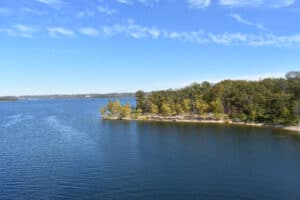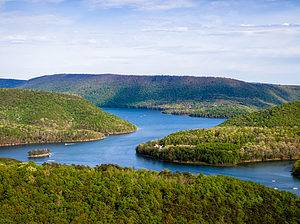As you approach Lake Jackson, one of the most striking features is the scenic beauty of the surrounding area. This freshwater lake in Florida draws in thousands of visitors for various reasons. Some seek the solitude and peace-inducing aspect of large water bodies to relax.
Others come for the tons of recreational opportunities available.
One of the most popular Lake Jackson pastimes is fishing, as it’s home to a large population of largemouth bass and other fish species. This lake holds a wealth of diverse fish species, attracting both recreational and competitive fishermen. Whether searching for trophy bass or simply enjoying the tranquility of casting a line, Lake Jackson is a prime destination for all fishing enthusiasts. Animal lovers also get their fill of wildlife or bird watching.
So, what more is there to know about Lake Jackson? Read on to find out.
Lake Jackson at a Glance
Location: Northern side of Tallahassee Hills, Leon County
Size: 4,000 acres
Depth: 6 feet, but sinkholes can be as deep as 28 feet or more
Fishing seasons: Open
Fish species: Largemouth bass, redear sunfish, black crappie, blue gill, etc.
Fishing License requirement: Yes, for anyone above 16
Lake Jackson Location and Size
Lake Jackson is in Leon County, Florida within the northern side of the Tallahassee Hills. The landscape surrounding the lake is quite fascinating because it comprises unique land formations. This spans five counties, from the Withlacoochee River to the Apalachicola River. Lake Jackson sits 200 to 230 feet above sea level, surrounded by steep hills forming the lake sub-basin.
Lake Jackson spans roughly 4,000 acres with a depth of about 6 feet, making it a shallow prairie lake. But two specific parts, the Lime Sink and Porter Hole Sink, are as deep as 28 feet.
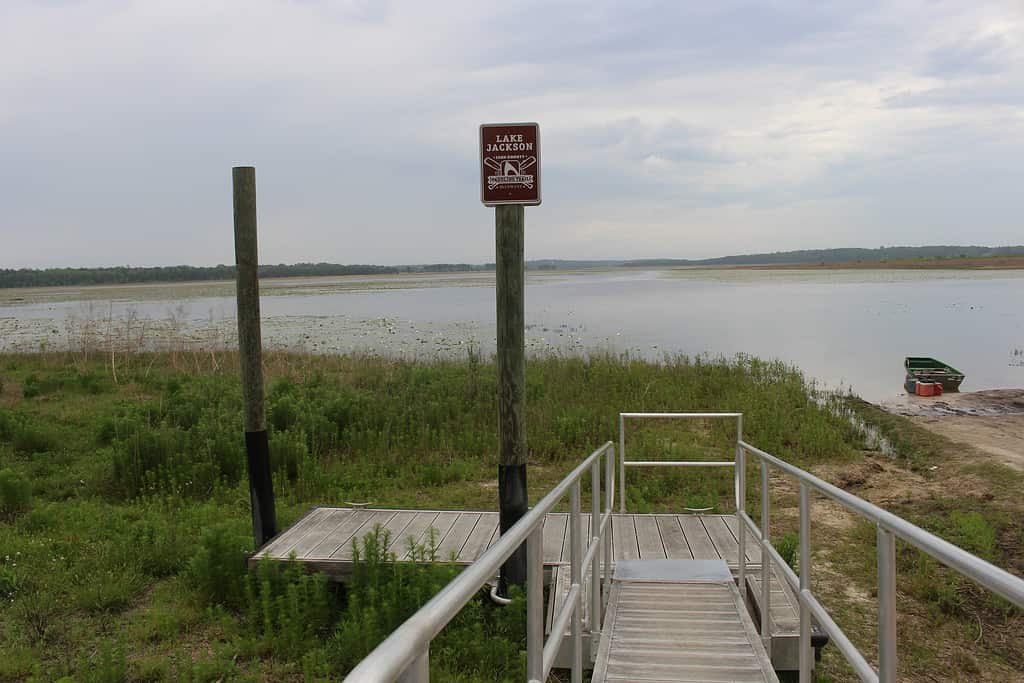
Lake Jackson spans roughly 4,000 acres with a depth of about 6 feet, making it a shallow prairie lake.
©Michael Rivera, CC BY-SA 4.0, via Wikimedia Commons – Original / License
Lake Jackson Formation
Lake Jackson owes its existence to limestone dissolution resulting in the collapse of overlying sediments. The geological process doesn’t happen overnight, though. Indeed, it takes thousands of years. Lake Jackson is a karst lake, which describes a water body sitting in a landscape characterized by soluble rocks, such as limestone or gypsum.
The karst formation is quite fascinating, going something like this:
- Rainwater picks up carbon dioxide from the atmosphere, making it acidic.
- Movement of the acidic rainwater through soil increases acidity level.
- The acidic water starts to dissolve the soluble rocks resulting in conduits, cavities, and caves. Water can get in due to the porous or permeable nature of the rocks.
- Eventually, the overlying sediments collapse into voids, creating karst topography and sinkholes. The brittle nature of limestone means they easily fracture.
In the case of Lake Jackson, the limestone dissolution led to a lowering of the surface, thus creating a basin. When water levels are low, you can see void spaces. The limestone dissolution continues to date and will continue to do so.
Periodic Draining of Lake Jackson
Lake Jackson has, over the years, had a series of drawdown events. To the layman, these are periodic draining events that water management authorities carry out for specific reasons. The most common ones are:
- Aquatic vegetation management, especially for invasive species, lowers the water level, exposes the species to sunlight and air, and inhibits their growth.
- Sediment removal from the lake bottom restores the water capacity and clarity.
- Habitat restoration by temporarily lowering water levels exposes wetlands, shorelines, or submerged structures.
- Infrastructure maintenance, including inspections and repair work, help drain the water and provide easier access to the areas of concern.
The drawback can also occur naturally. In this case, the sediments plugging sinkholes can collapse, thus funneling water into the aquifer.
Visitors flock to the lake during the drawdown to glimpse the phenomenon. Also, at this time, there’s a lot of bird life, which comes to eat the exposed fish, thus attracting thousands of birdwatchers.
Fishing at Lake Jackson
Lake Jackson is a dedicated aquatic preserve, meaning it enjoys protection from conservation organizations and government agencies. This is because the Tallahassee area has what is considered a unique environmental significance. The significance of the Tallahassee area lies in its diverse and delicate ecological balance.
It encompasses rare habitats, rich biodiversity, and critical ecological functions. It is home to unique plant and animal species, pristine natural areas, and vital water resources, making it a focal point for conservation efforts.
A critical feature of this lake is the abundance of fish species, most notably the largemouth bass. Others include redear sunfish, black crappie, and bluegill. Plan your Lake Jackson fishing trip for any time of the year. But for the best bass catch, aim for spring to early summer which falls from February to May.
Please note there’re regulations governing fishing at Lake Jackson. For instance, while largemouth bass fishing seasons are open, there’s a 5-bag limit. The maximum fish length should be 16 inches, and you can’t use any part of the fish as bait.
Anglers below the age of 16 don’t need a freshwater fishing license. Get the necessary information on the Florida Fish and Wildlife Conservation Commission website.
The local fishing authorities should also be able to advise. Ensure a positive experience and compliance with regulations by staying informed about the latest Lake Jackson news.
Note that water levels tend to vary at Lake Jackson. You’ll have a nightmarish time navigating if you lack area experience or knowledge. Make your life simpler by hiring a local guide to show you some of the best fishing spots. They’ll also free you from the hassle of managing the boat, allowing you to concentrate on reeling in your catch.
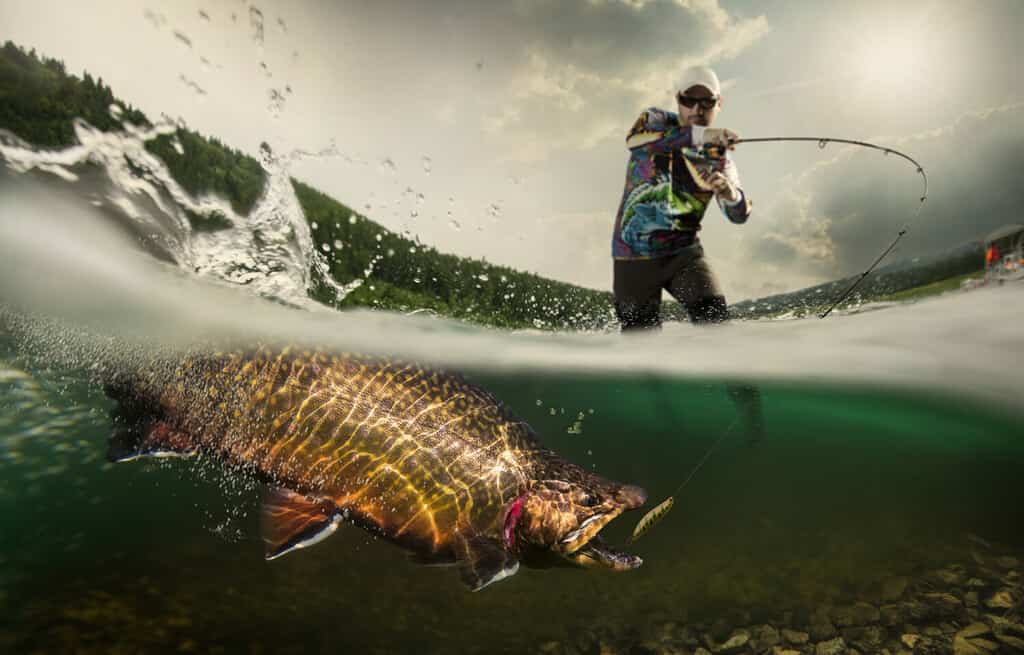
Lake Jackson is an aquatic preserve renowned for its ample fish population and scenic beauty.
©Rocksweeper/Shutterstock.com
Visit the State Park
The Lake Jackson Mounds Archeological State Park is another must-visit site. You get to enjoy the natural surroundings while learning about the history of the place. Native Indians lived around Lake Jackson over eight hundred years ago. At the time, the natives called the area the Southeastern Ceremonial Complex.
Currently, you’ll find six temple mounds, which could explain the state park’s name. Some of the mounds are huge, with the largest being 36 feet tall with a 278 by 312 foot base.
Besides the archaeological sites are trails that hikers will love. Carry along a picnic and enjoy your food in the natural environment. There’s a designated picnic site near the most prominent mound.
Travel 2 miles from Tallahassee off US 27 to get to the park. Lookout for Crowder Road and then take a right onto Indian Mounds Road.
Please note that there’s an applicable admission fee per vehicle. Each car can only carry eight people maximum. Visitors walking or cycling also have to pay an entrance fee. Please refer to the park website for the actual amounts.
Explore Other Parts of Tallahassee
Don’t confine yourself to the Lake Jackson River environs. Tallahassee is a fun area with many attractions and fun activities for you and the kids. Plan to visit one of the oldest Florida lighthouses, the St. Marks lighthouse.
Try the local foods and see how the locals prepare the largemouth bass and other fish species. The Railroad Square State Park will expose you to more of Tallahassee’s history.
Animal Species in and Around Lake Jackson
Lake Jackson and its surroundings teem with diverse aquatic and animal species creating a vibrant and thriving ecosystem. Let’s check out what wildlife you can expect to spot on a visit to Lake Jackson.
Largemouth Bass and Other Fish Species
The largemouth bass is the star attraction at Lake Jackson. You’ll also find reference to it as the state freshwater fish in Alabama, Mississippi, Florida, and Georgia. Now here’s an interesting point to know. Despite their abundance in many freshwaters, these predatory fish are not a target for commercial fishing. The slow-growing, slow-producing fish tends to have a lot of size limit regulations to protect it from extinction.
The conservation and management authorities prioritize recreational fishing over commercial exploitation to protect the largemouth bass numbers. The largemouth bass is an angler’s favorite due to its aggressive nature. The fish doesn’t back down from a fight, making it a worthy opponent. The thrill of catching a trophy size fish is also something anglers crave.
When you look at the fish, it’s easy to see where the name comes from. The mouth is enormous, with the upper jaw extending beyond the eyes. Also fascinating are the jagged teeth on the bottom and top jaws. Let’s say it’s not the most beautiful fish, but it’ll taste delicious if you know the right recipe.
Other fish species in Lake Jackson include:
- Crappie
- Bluegill
- Redear sunfish
- Catfish
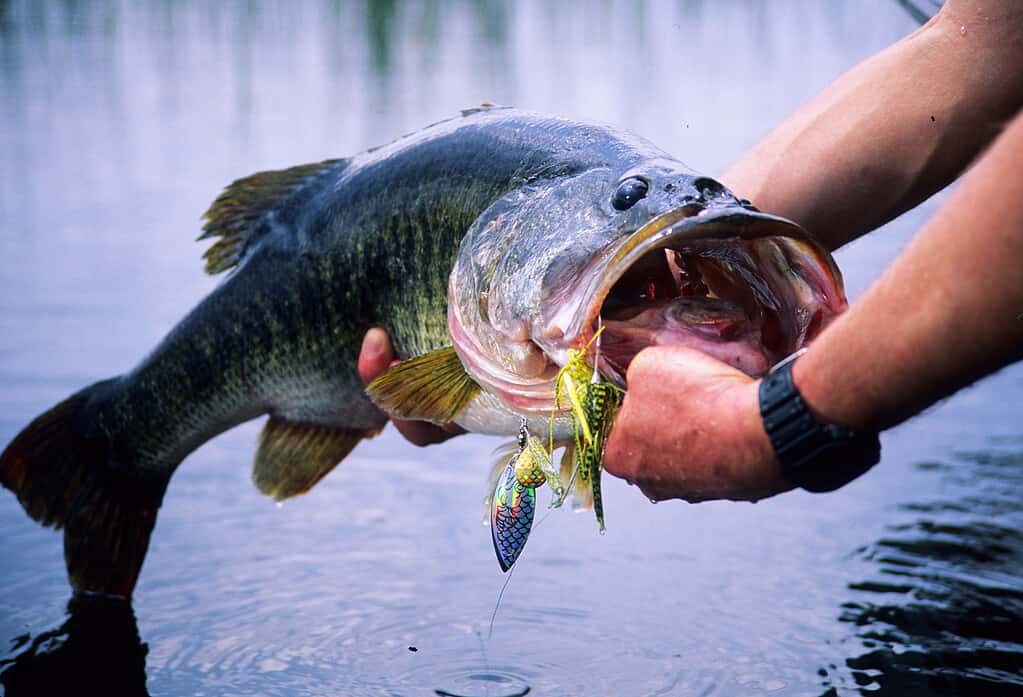
. The largemouth bass is an angler’s favorite due to its aggressive nature.
©iStock.com/stammphoto
Alligators
The beady-eyed, stealthy moving and super patient alligators also call Lake Jackson home. The reptiles can achieve remarkable growth, sometimes reaching a scary 4.5 meters long. You must keep your eyes peeled for them during your Lake Jackson trip. While they would rather avoid humans altogether, they’ll not back down if they feel threatened.
Birds
Lake Jackson has a large selection of birds along the shorelines and marshes, including:
- Herons
- Egrets
- Ibises
- Ospreys
- Bald Eagles
- Woodpeckers
- Ducks
- Songbirds
- Limpkin
- Red-tailed hawks
- Barred owls, etc.
The surrounding areas at Lake Jackson provide excellent habitats for the avian species. There’s also plenty of food for the birds, including the fish. It’s not uncommon to see wading birds like ibises and herons scouting for food in the shallow sections of the lake. Migratory birds, such as various ducks and the American white pelican, temporarily make Lake Jackson their home.
Mammal Species
Different mammals also co-exist within Lake Jackson. These include smaller ones like:
- Squirrels
- Armadillos
- Rabbits
- Raccoons
- Otters
- White-tailed deer
- Red foxes, etc.

The fascinating mammal species that inhabit the area surrounding Lake Jackson include squirrels, red foxes, otters, and rabbits, among other species.
©Michael Chatt/Shutterstock.com
Reptiles, Amphibians, and Invertebrates
Amphibians and reptiles also contribute to the wildlife at Lake Jackson. Common ones include frogs, toads, lizards, and snakes. Don’t step on an eastern diamondback rattlesnake or the garter snake. The garter snake may not be venomous, but you can be sure that the bite will be pretty painful.
Invertebrate species are numerous, including:
- Dragonflies
- Butterflies
- Water bugs
- Crayfish
- Mussels
A note of caution that you must always abide by – keep a safe distance from any wildlife because you must remember that you’re the intruder coming into their natural habitat. There may also be rules regarding interaction with such wildlife.
Lake Jackson Is Much More Than Just a Mere Lake
If Lake Jackson were a book, it would have so many chapters. There’s a fascinating story behind its formation. The natural and human-led drawbacks are a marvel to see. Its diverse offerings make it a precious gem, inviting visitors to explore and appreciate the hidden depths of this fantastic location.
Another chapter in the Lake Jackson story would be the diversity in flora and fauna. And, of course, it’s an exciting chance to catch a largemouth bass. And when you need to relax, there are multiple places to do so. Lake Jackson is indeed a fascinating body of water and one worth seeing.
The photo featured at the top of this post is © Rocksweeper/Shutterstock.com
Thank you for reading! Have some feedback for us? Contact the AZ Animals editorial team.




